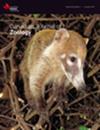Contractile function of fasting and digesting broad-snouted caiman (Caiman latirostris)
IF 1.1
4区 生物学
Q3 ZOOLOGY
引用次数: 0
Abstract
Feeding regimes are a critical process to ensure survival and reproduction, which modulate several behavioral and physiological patterns of ectotherms, especially cardiovascular adjustments. However, crocodilian myocardial contractile function after food intake remains understudied. We investigated the importance of ventricular myocardial contractility during digestion in the broad-snouted caiman, Caiman latirostris Daudin, 1801. Isometric ventricle preparations and Ca2+-handling protein expression were used to investigate the effects of prolonged fasting (30 days) and feeding (48 h after feeding on meals at 15% of body mass) on cardiac function. Upon feeding, there was no significant difference in relative ventricular mass. The cardiac response of the caiman to digestion was characterized by upregulation of the Na+/Ca2+ exchanger expression and an increase in myocardial contractility (positive inotropism and lusitropism) within the physiological range of heart rate. The digesting caiman's ventricular myocardium was able to maintain faster kinetics of contraction and relaxation, allowing for significantly increased cardiac pumping capacity at higher pacing frequencies. Our results demonstrated that the myocardium of broad-snouted caimans exhibits specializations in excitation–contraction coupling, which can provide a means to support high cardiovascular performance during digestion.宽吻凯曼的禁食和消化收缩功能
摄食制度是确保变温动物生存和繁殖的一个关键过程,它调节了变温动物的几种行为和生理模式,特别是心血管调节。然而,鳄鱼摄食后的心肌收缩功能仍未得到充分研究。我们研究了宽嘴凯门鳄(caiman latirostris Daudin, 1801)在消化过程中心室心肌收缩力的重要性。采用等长心室制剂和Ca2+处理蛋白表达来研究长时间禁食(30天)和饲喂(以体重的15%饲喂后48 h)对心功能的影响。饲喂后,各组相对心室质量无显著差异。凯门鳄对消化的心脏反应的特征是Na+/Ca2+交换器表达上调,心肌收缩力(正性肌力和lusittropism)在心率的生理范围内增加。消化凯门鳄的心室心肌能够保持更快的收缩和松弛动力学,允许在更高的起搏频率下显着增加心脏泵送能力。我们的研究结果表明,宽吻凯门鳄的心肌表现出兴奋-收缩耦合的特化,这可以提供一种在消化过程中支持高心血管性能的手段。
本文章由计算机程序翻译,如有差异,请以英文原文为准。
求助全文
约1分钟内获得全文
求助全文
来源期刊

Canadian Journal of Zoology
生物-动物学
CiteScore
2.40
自引率
0.00%
发文量
82
审稿时长
3 months
期刊介绍:
Published since 1929, the Canadian Journal of Zoology is a monthly journal that reports on primary research contributed by respected international scientists in the broad field of zoology, including behaviour, biochemistry and physiology, developmental biology, ecology, genetics, morphology and ultrastructure, parasitology and pathology, and systematics and evolution. It also invites experts to submit review articles on topics of current interest.
 求助内容:
求助内容: 应助结果提醒方式:
应助结果提醒方式:


